-
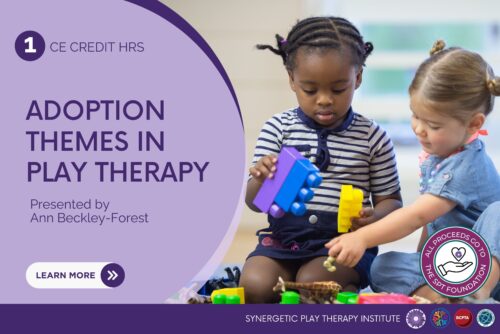 While adoption is often seen as the solution to the problem of child maltreatment, the disruption of primary attachments is also a risk factor for children after placement. Play therapists can play an important role in recognizing the impact of these attachment wounds as well as themes of belonging and identity formation that become increasingly pressing for children as they grow up in adoptive families, foster families, and kinship adoption. In this session we will look at a prescriptive play therapy approach to this work including the themes that can emerge in the child’s play, approaching the traumatic history of disruption and placement through the attachment narratives, and how to support the adoptive parents in adjusting their expectations and strategies. Of special note will be the important considerations related to race, ethnicity, and culture that often impact the adoption kinship network and ways to invite those themes in the play therapy process.
While adoption is often seen as the solution to the problem of child maltreatment, the disruption of primary attachments is also a risk factor for children after placement. Play therapists can play an important role in recognizing the impact of these attachment wounds as well as themes of belonging and identity formation that become increasingly pressing for children as they grow up in adoptive families, foster families, and kinship adoption. In this session we will look at a prescriptive play therapy approach to this work including the themes that can emerge in the child’s play, approaching the traumatic history of disruption and placement through the attachment narratives, and how to support the adoptive parents in adjusting their expectations and strategies. Of special note will be the important considerations related to race, ethnicity, and culture that often impact the adoption kinship network and ways to invite those themes in the play therapy process. -
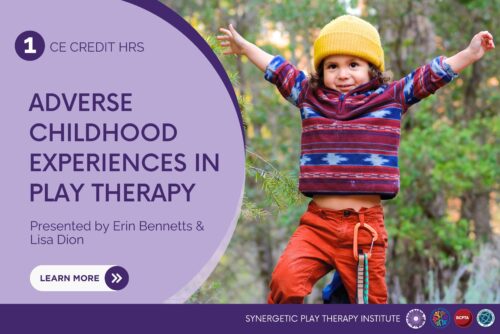 Adverse Childhood Experiences (ACES) can be a part of growing up. But how can we help turn these obstacles into opportunities for growth and resilience and apply this knowledge to the play therapy process? This course explores how play therapy can be used to help mitigate the effects of ACES. Learn the major categories of ACES, along with protective factors or strategies that have been shown to be helpful both in the short-term and long-term. This course is designed to enhance or increase the professional knowledge of graduate-level counselors.
Adverse Childhood Experiences (ACES) can be a part of growing up. But how can we help turn these obstacles into opportunities for growth and resilience and apply this knowledge to the play therapy process? This course explores how play therapy can be used to help mitigate the effects of ACES. Learn the major categories of ACES, along with protective factors or strategies that have been shown to be helpful both in the short-term and long-term. This course is designed to enhance or increase the professional knowledge of graduate-level counselors. -
 Aggression and death are common parts of the play therapy process, yet many therapists don’t have a clear understanding of what to do and how to facilitate intensity. This can lead to inadvertently promoting aggression and low brain disorganization. It can also lead to the therapist feeling beat up, exhausted, and hyper-aroused, ultimately impacting their ability to stay attuned, remain present, and find inspiration in this field. Enter Synergetic Play Therapy! Through an SPT lens, and a heavy dose of neuroscience, this 2-hour course helps therapists learn how to use play in a way that supports regulation – their own and their client’s! See course details below.
Aggression and death are common parts of the play therapy process, yet many therapists don’t have a clear understanding of what to do and how to facilitate intensity. This can lead to inadvertently promoting aggression and low brain disorganization. It can also lead to the therapist feeling beat up, exhausted, and hyper-aroused, ultimately impacting their ability to stay attuned, remain present, and find inspiration in this field. Enter Synergetic Play Therapy! Through an SPT lens, and a heavy dose of neuroscience, this 2-hour course helps therapists learn how to use play in a way that supports regulation – their own and their client’s! See course details below. -
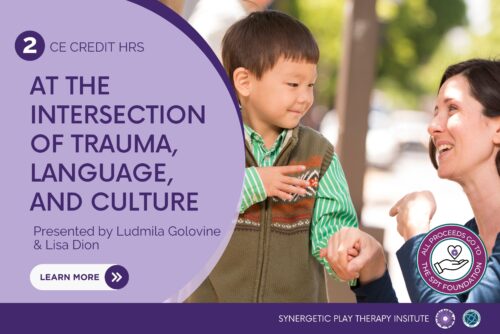 This dynamic, two-hour video course delves into the intricate interplay between trauma, neurocognitive processes, and communication patterns, shedding light on the challenges therapists face when working with survivors of trauma, especially those from culturally diverse backgrounds or with language barriers. Did you know that trauma's profound impact on neurocognitive functioning can significantly influence communication dynamics within therapeutic settings? This, coupled with cultural and linguistic disparities, can pose an added challenge when trying to establish rapport and foster healing with clients, particularly among Limited English Proficient or Deaf/Hard of Hearing individuals! Join Mila Golovine, President & CEO of Masterword. and Lisa Dion, Founder & President of the Synergetic Play Therapy Institute as they navigate the intersections of cultural competency, trauma-informed therapy, and effective communication strategies. You will also get insights into enhancing the therapeutic alliance, fostering better client engagement, and ultimately improving therapeutic outcomes! Key highlights include:
This dynamic, two-hour video course delves into the intricate interplay between trauma, neurocognitive processes, and communication patterns, shedding light on the challenges therapists face when working with survivors of trauma, especially those from culturally diverse backgrounds or with language barriers. Did you know that trauma's profound impact on neurocognitive functioning can significantly influence communication dynamics within therapeutic settings? This, coupled with cultural and linguistic disparities, can pose an added challenge when trying to establish rapport and foster healing with clients, particularly among Limited English Proficient or Deaf/Hard of Hearing individuals! Join Mila Golovine, President & CEO of Masterword. and Lisa Dion, Founder & President of the Synergetic Play Therapy Institute as they navigate the intersections of cultural competency, trauma-informed therapy, and effective communication strategies. You will also get insights into enhancing the therapeutic alliance, fostering better client engagement, and ultimately improving therapeutic outcomes! Key highlights include:- Understanding how trauma affects neurocognitive processes and communication patterns.
- Exploring cultural competence in therapy and its significance in trauma recovery.
- Identifying challenges and strategies for effective communication with clients from diverse backgrounds.
- Best practices for working with Limited English Proficient or Deaf/Hard of Hearing clients.
- Practical techniques to promote therapeutic alliance and engagement.
- Ethical considerations and sensitivity when utilizing interpreters in therapy sessions.
-
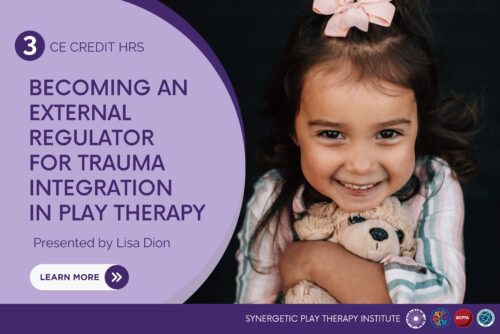 Research in neuroscience and interpersonal neurobiology sheds light on the need for the play therapist to act as the external regulator supporting the child to move towards the intensity they are experiencing allowing for integration. This 3 hour video course explores this need during trauma integration for two primary reasons: 1) The child need to borrow the play therapist’s regulatory capacity as they work through their traumatic thoughts, feelings and sensations in play therapy and 2) The play therapist’s ability to regulate themselves during the intensity increases the capacity for presence and attunement with the child, while simultaneously supporting the health and longevity of their own nervous system. Without the ability of the play therapist to become the external regulator for the intensity that arises during trauma integration, both the child and the play therapist are at risk for emotional flooding and high levels of dysregulation in their nervous systems. Over time, this can significantly impact a play therapist’s longevity in the field, as well as the ability to stay attuned and present to a child in sessions. This course is a recording of a 3 hour live webinar with Trusted Provider Network. See course details below.
Research in neuroscience and interpersonal neurobiology sheds light on the need for the play therapist to act as the external regulator supporting the child to move towards the intensity they are experiencing allowing for integration. This 3 hour video course explores this need during trauma integration for two primary reasons: 1) The child need to borrow the play therapist’s regulatory capacity as they work through their traumatic thoughts, feelings and sensations in play therapy and 2) The play therapist’s ability to regulate themselves during the intensity increases the capacity for presence and attunement with the child, while simultaneously supporting the health and longevity of their own nervous system. Without the ability of the play therapist to become the external regulator for the intensity that arises during trauma integration, both the child and the play therapist are at risk for emotional flooding and high levels of dysregulation in their nervous systems. Over time, this can significantly impact a play therapist’s longevity in the field, as well as the ability to stay attuned and present to a child in sessions. This course is a recording of a 3 hour live webinar with Trusted Provider Network. See course details below. -
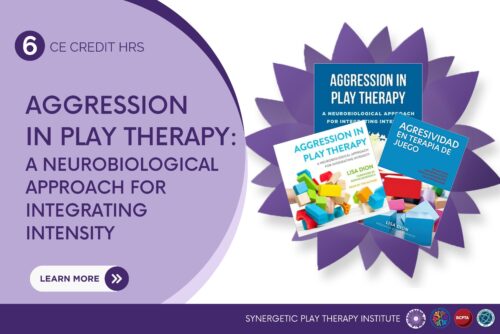 With an understanding of aggressive play based on brain function and neuroscience, this book provides therapists with a framework to work authentically with aggressive play, while making it an integrative and therapeutic experience for the child. Through the lens of principles from Synergetic Play Therapy®, therapists are taught how to integrate the intensity experienced by both the child and the therapist during aggressive play in a way that leads towards greater healing and integration. The book explains the neurological processes that lead kids to dysregulation and provides therapists with tools to help their clients facilitate deep emotional healing, without causing their own nervous system to shut down. Chapter Topics Include:
With an understanding of aggressive play based on brain function and neuroscience, this book provides therapists with a framework to work authentically with aggressive play, while making it an integrative and therapeutic experience for the child. Through the lens of principles from Synergetic Play Therapy®, therapists are taught how to integrate the intensity experienced by both the child and the therapist during aggressive play in a way that leads towards greater healing and integration. The book explains the neurological processes that lead kids to dysregulation and provides therapists with tools to help their clients facilitate deep emotional healing, without causing their own nervous system to shut down. Chapter Topics Include:- Aggression in the Playroom and Making Aggressive Play Therapeutic
- Understanding the Nervous System
- What Regulation Really Means
- Developing Yourself as the External Regulator
- The Set-Up in Play Therapy
- Authentic Expression
- Setting Boundaries
- Working with Emotional Flooding
- Hyper-Aroused Play
- Observing Play
- Hypo-Aroused Play
- Working with Parents
-
 Whether you're looking for how to engage the resistant child, turn Adverse Childhood Experiences (ACEs) into opportunities for growth and resilience, use yoga to increase your ability to connect to yourself and your clients, or create a neuroception of safety in the playroom, we have you covered. Explore these topics and so many others in our one-hour courses below. Then choose 4 courses to create a bundle for only $119 and save (valued at $140 USD!) You can buy as many bundles as you would like (each as a new order)! See below for course descriptions. To view course details and objectives, click to the right of the title.
Whether you're looking for how to engage the resistant child, turn Adverse Childhood Experiences (ACEs) into opportunities for growth and resilience, use yoga to increase your ability to connect to yourself and your clients, or create a neuroception of safety in the playroom, we have you covered. Explore these topics and so many others in our one-hour courses below. Then choose 4 courses to create a bundle for only $119 and save (valued at $140 USD!) You can buy as many bundles as you would like (each as a new order)! See below for course descriptions. To view course details and objectives, click to the right of the title. -
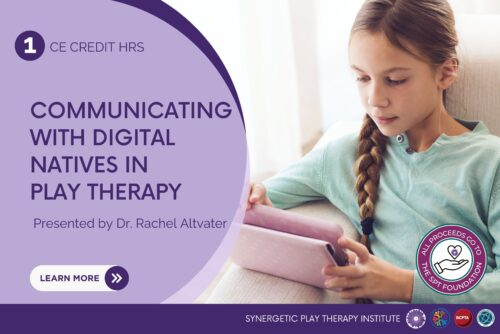 In today’s digital era, children’s play has expanded into new realms, where they engage, connect, and communicate in transformative ways. To support young clients effectively, play therapists must understand and embrace the evolving world of digital play. This insightful course with Dr. Rachel Altvater explores how the digital landscape shapes children’s engagement, self-expression, and identity. Starting with a reflection on your own perspectives about digital native culture, you’ll dive into how digital environments influence children and adolescents, equipping you to meet them where they are. Through practical strategies, you’ll learn to connect with clients in their digital spaces, foster meaningful therapeutic relationships, and seamlessly integrate digital tools into your play therapy practice. The session also examines the vital role of digital identity, uncovering how this space serves as more than entertainment—it’s where young clients form relationships, build resilience and navigate their world. By the end of this course, you’ll walk away with fresh insights and actionable techniques to strengthen the therapeutic alliance, deepen connections, and achieve meaningful outcomes with the digital natives you serve.
In today’s digital era, children’s play has expanded into new realms, where they engage, connect, and communicate in transformative ways. To support young clients effectively, play therapists must understand and embrace the evolving world of digital play. This insightful course with Dr. Rachel Altvater explores how the digital landscape shapes children’s engagement, self-expression, and identity. Starting with a reflection on your own perspectives about digital native culture, you’ll dive into how digital environments influence children and adolescents, equipping you to meet them where they are. Through practical strategies, you’ll learn to connect with clients in their digital spaces, foster meaningful therapeutic relationships, and seamlessly integrate digital tools into your play therapy practice. The session also examines the vital role of digital identity, uncovering how this space serves as more than entertainment—it’s where young clients form relationships, build resilience and navigate their world. By the end of this course, you’ll walk away with fresh insights and actionable techniques to strengthen the therapeutic alliance, deepen connections, and achieve meaningful outcomes with the digital natives you serve. -
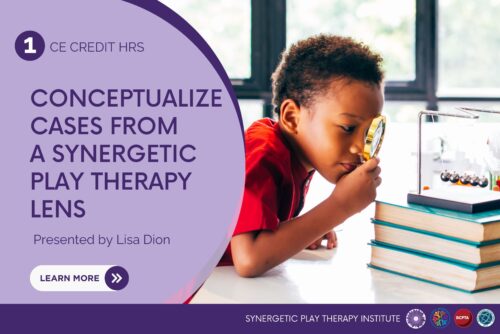 The Synergetic Play Therapy Institute in collaboration with PIP Solutions presents “Conceptualizing Cases from a Synergetic Play Therapy Lens”. Translating a right brain play experience into a left brain conceptualization is not an easy task. Play therapists often grapple with a sense of uncertainty when trying to comprehend a child’s unique therapeutic progression and assessing whether goals are being achieved. This course, led by Lisa Dion, aims to address this issue by introducing a structured framework derived from Synergetic Play Therapy. Students will gain insights into how to conceptualize cases effectively and apply this framework to enhance the efficacy of their therapeutic interventions.
The Synergetic Play Therapy Institute in collaboration with PIP Solutions presents “Conceptualizing Cases from a Synergetic Play Therapy Lens”. Translating a right brain play experience into a left brain conceptualization is not an easy task. Play therapists often grapple with a sense of uncertainty when trying to comprehend a child’s unique therapeutic progression and assessing whether goals are being achieved. This course, led by Lisa Dion, aims to address this issue by introducing a structured framework derived from Synergetic Play Therapy. Students will gain insights into how to conceptualize cases effectively and apply this framework to enhance the efficacy of their therapeutic interventions. -
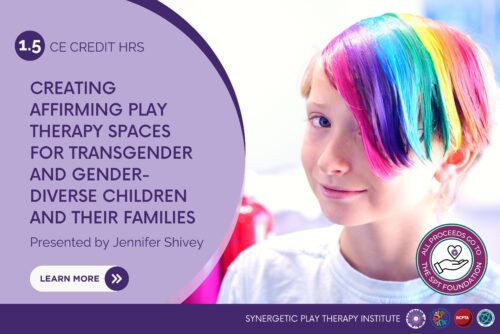 Transgender and gender-diverse children face unique challenges in navigating their identities and experiences. Their families face challenges, too, but can often be fearful of voicing them due to worries about how others may perceive them. Clinicians are often well meaning but can do unintended harm due to the blind spots they are not aware of when working with this population. Play therapy offers a dynamic and effective approach to support these children and their families in understanding and expressing themselves in a safe and affirming environment, given the appropriate knowledge offered by the clinician. This workshop aims to equip therapists with the knowledge, skills, and confidence necessary to provide effective and affirming play therapy for transgender and gender-diverse children - and their families! Scroll down for all of the course details!
Transgender and gender-diverse children face unique challenges in navigating their identities and experiences. Their families face challenges, too, but can often be fearful of voicing them due to worries about how others may perceive them. Clinicians are often well meaning but can do unintended harm due to the blind spots they are not aware of when working with this population. Play therapy offers a dynamic and effective approach to support these children and their families in understanding and expressing themselves in a safe and affirming environment, given the appropriate knowledge offered by the clinician. This workshop aims to equip therapists with the knowledge, skills, and confidence necessary to provide effective and affirming play therapy for transgender and gender-diverse children - and their families! Scroll down for all of the course details! -
 This webinar will explore the myriad ways in which children show us the hard things that have happened to them. There are as many ways for children to share their pain with us as there are stories to be told. After three decades of Storykeeping, TraumaPlay has identified three primary posttraumatic play pathways that children use to create coherence in their internal narratives. These three pathways allow for play-based gradual exposure to occur while integrating thoughts, feelings, and sensory impressions connected to the trauma. TraumaPlay gives permission for a “yes, and” approach to the sometimes overwhelming question of whether to use directive or non-directive play therapy approaches with traumatized children and expands our conceptual framework for following the child’s need in trauma processing.
This webinar will explore the myriad ways in which children show us the hard things that have happened to them. There are as many ways for children to share their pain with us as there are stories to be told. After three decades of Storykeeping, TraumaPlay has identified three primary posttraumatic play pathways that children use to create coherence in their internal narratives. These three pathways allow for play-based gradual exposure to occur while integrating thoughts, feelings, and sensory impressions connected to the trauma. TraumaPlay gives permission for a “yes, and” approach to the sometimes overwhelming question of whether to use directive or non-directive play therapy approaches with traumatized children and expands our conceptual framework for following the child’s need in trauma processing. -
 This 1.5-hour recorded webinar, in the form of a roundtable discussion, delves into the evolving landscape of diversity, inclusion, and cultural awareness in mental health, exploring how to create a more inclusive and culturally sensitive clinical practice. Led by Lisa Dion, guest panelists Marshall Lyles, Liliana Baylon, and Robert Jason Grant will share their insights and expertise on a range of essential topics, fostering a deeper understanding of the role culture plays in the therapy process, embracing neurodiversity, and creating inclusive play spaces to cater to individual needs. *The course is provided by the Synergetic Play Therapy Foundation. The Synergetic Play Therapy Foundation is dedicated to helping make play therapy trainings accessible and affordable to clinicians worldwide and to funding research initiatives in Synergetic Play Therapy. The Synergetic Play Therapy Foundation provides scholarships to clinicians seeking post-graduate training in Synergetic Play Therapy or another play therapy model of their choosing. Scholarships are funded through donations from webinars, donors, and supporters of Play Therapy. By purchasing this course, you are making a direct donation to the Synergetic Play Therapy Foundation. All proceeds will contribute to future scholarships and to the foundation itself! Please scroll down for course details and objectives.
This 1.5-hour recorded webinar, in the form of a roundtable discussion, delves into the evolving landscape of diversity, inclusion, and cultural awareness in mental health, exploring how to create a more inclusive and culturally sensitive clinical practice. Led by Lisa Dion, guest panelists Marshall Lyles, Liliana Baylon, and Robert Jason Grant will share their insights and expertise on a range of essential topics, fostering a deeper understanding of the role culture plays in the therapy process, embracing neurodiversity, and creating inclusive play spaces to cater to individual needs. *The course is provided by the Synergetic Play Therapy Foundation. The Synergetic Play Therapy Foundation is dedicated to helping make play therapy trainings accessible and affordable to clinicians worldwide and to funding research initiatives in Synergetic Play Therapy. The Synergetic Play Therapy Foundation provides scholarships to clinicians seeking post-graduate training in Synergetic Play Therapy or another play therapy model of their choosing. Scholarships are funded through donations from webinars, donors, and supporters of Play Therapy. By purchasing this course, you are making a direct donation to the Synergetic Play Therapy Foundation. All proceeds will contribute to future scholarships and to the foundation itself! Please scroll down for course details and objectives.

